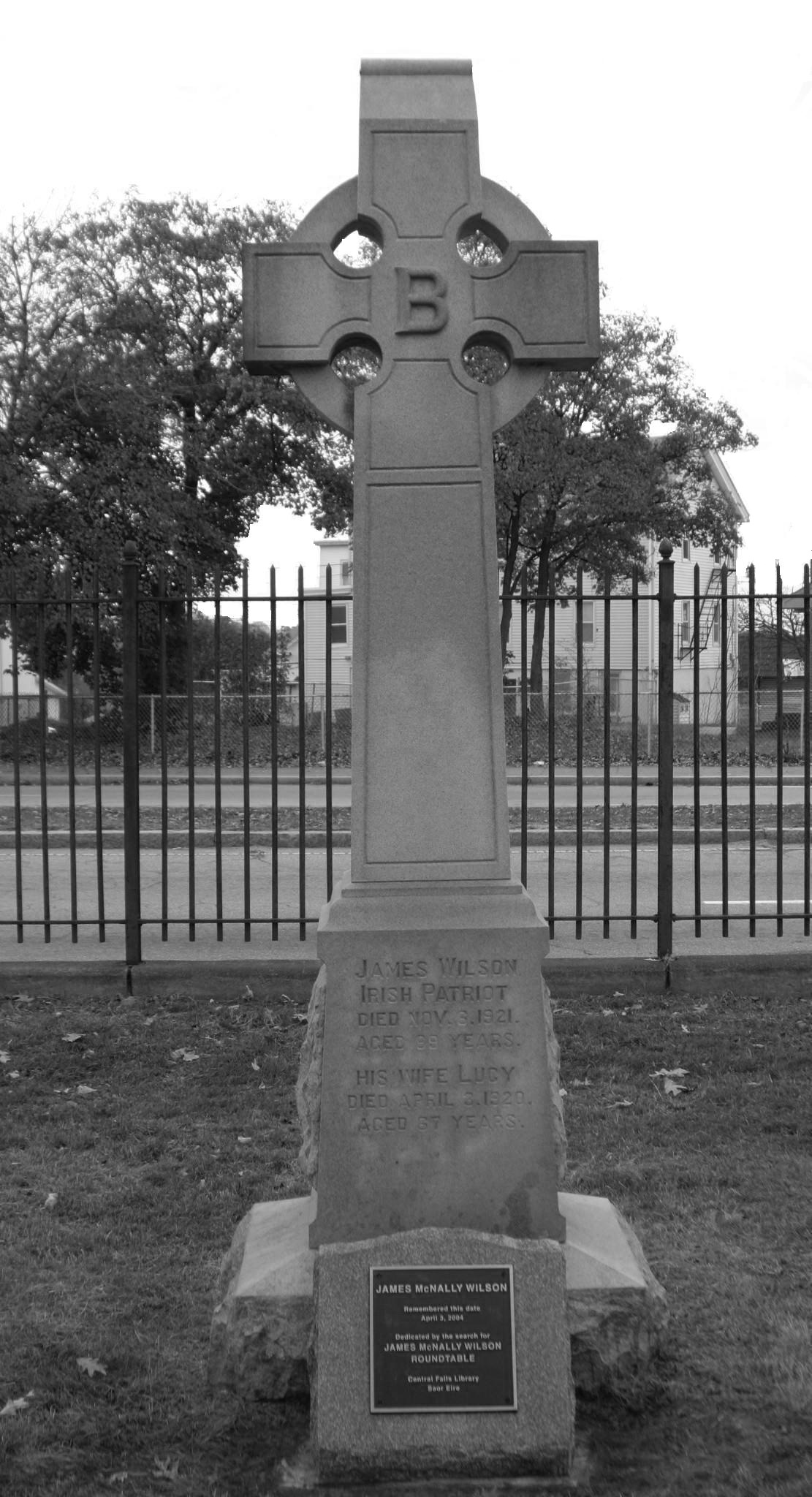James Wilson died in November 1921.
James 'McNally' Wilson (1832 - 1921)
British soldier, Fenian recruit in the British army, Prisoner,
One of the six prisoners featured in the Catalpa rescue odyssey
 James 'McNally' Wilson
was born in Newry, Co. Down, Ireland on February 6,
1832.
Little is known of his childhood other than he grew up
during the "Great Hunger" years of 1845 thru 1850.
He was on of the lucky ones who survived the
devastation and
hopelessness wrought by an avoidable famine that
took the lives of over a million souls and loosed
the greatest mass exodus in Irish history.
James 'McNally' Wilson
was born in Newry, Co. Down, Ireland on February 6,
1832.
Little is known of his childhood other than he grew up
during the "Great Hunger" years of 1845 thru 1850.
He was on of the lucky ones who survived the
devastation and
hopelessness wrought by an avoidable famine that
took the lives of over a million souls and loosed
the greatest mass exodus in Irish history.
There is no information readily available regarding McNally's exposure to a formal education. Nonetheless, it would be reasonable to assume that he attended one of the local primary schools that comprised the national school system set-up in 1831. Its obvious that not alone was he literate, but, based on his "letter from the Tomb" that he possessed a unique literary talent that few of his contemporaries equalled.
McNally prospects for a decent livelihood in Ireland, as was the case with the vast majority of his fellow countrymen and women, were non existent. In order to escape that fate one either emigrated or joined the ranks of the British colonial army. He choose the latter and in 1850 at age eighteen signed up using the an alias 'James Wilson" to avoid arrest for an earlier incident with the Royal Irish Constabulary.
For the next ten years Wilson served in the Bombay Artillery and was stationed in India, Syria and Canada. During his years of service he became an explosives expert. In the early 1860s he returned to Ireland where he joined the 5th Dragoon Guards.
In the early 1860's agents of the Irish Republican Brotherhood (IRB) led by John Boyle O'Reilly were actively recruiting fellow Irishmen within the ranks of the British army in Ireland to join the IRB who were at that time were preparing to stage an uprising at an opportune time. By the time Wilson was approached in 1864 he was, as one would assume, disenchanted with the British army and angered by their mistreatment of their colonial wards. Giving the opportunity to redeem his honor he was ready and willing to swear allegiance to the IRB knowing that when the time came he would do his part to free his homeland from his colonial master. During the remainder of his time in the army he recruited many of his fellow countrymen to join the IRB and be ready to bear arms when the time came.
In November of 1865, in anticipation of an imminent uprising Wilson deserted and went into hiding biding his time for the call to arms. In February of 1866 he was arrested when the safe house in which he was hiding was raided by the police on information provided by an informer, Patrick Curran.
On August 20, 1865 Wilson was court-martialed for desertion and mutinous conduct and sentenced to death, a sentence later commute to life imprisonment with hard labor. On October 12, 1867 he was placed aboard the Hougoumont, the last convict ship to sail to Australia, with 280 convicts amongst them 59 Fenians prisoners.
From the onset life was hard for the Fenians prisoners who had served in the British army. While other Fenians prisoners were allowed to live and work together former British soldiers including Wilson were dispersed amongst the general convict population and treated harshly. The harsh treatment they received took a heavy toll on their health both physically and mentally.
By 1871 most of the Fenians were released as a result of British amnesties issued in response to pressure by the Amnesty Association and others and also in hopes of easing brewing unrest in Ireland. The only Fenians prisoners not granted pardons were the former British soldiers. Due to the nature of their offences they were doomed to spend the rest of their lives in prison.
Aware of their predicament Wilson together with five of his compatriots set about planning their escape. Realizing that without outside help escape was impossible he wrote letters to Fenian groups in Ireland, England and to John Devoy in the United States pleading for help and spelling out in detail how best to effect a rescue. Below is are excerpts from the letter sent to Devoy;
"And what a death is staring us in the face, the death of a felon in a British (sic) dungeon, and a grave amongst Britton's ruffians. I am not ashamed to speak the truth ... that it is a disgrace to have us in prison today. A little money judiciously expended would release every man that is now in West Australia... Think that we have been nearly nine years in this living tomb since our first arrest, and that it is impossible for mind or body to withstand the continual strain that is upon them. One or the other must give way...."
Devoy and other selected members of Clan na Gael heeded Wilsons "voice from the Tomb" letter and set about the almost impossible task of raising sufficient money, planning the rescue and maintaining the absolute secrecy necessary to even attempt such an audacious venture. When the planning was complete two Fenian agents John Breslin and Thomas Desmond, posing as American businessmen, traveled to Australia to coordinate the rescue attempt. On April 17, 1876 the six Fenians, Thomas Darragh, Martin Hogan, Michael Harrington, Thomas Hassett, Robert Cranston and Wilson made good their escape in carriages manned by Breslin and Desmond. After a harrowing 30 mile dash from the prison in Fremantle to the beach they boarded a row boat to take them to the getaway vessel, the Catalpa, moored some distance off shore.
After weathering a severe storm and a harrowing pursuits by police cutters and the commandeered steamship Georgette the Catalpa broke free into open waters making good their escape. After a circuitous four month journey to avoid pursuing British navy warships the Catalpa docked in New York harbor on August 19, 1876 to a tumultuous welcome.
With help from Clan na Gael Wilson settled in Central Falls, Rhode Island, where he got married and raised a family. Despite suffering from heart disease resulting from the harsh treatment he received during his nine years of imprisonment in Fremantle he lived long enough to witness the Easter Rising of 1916 and the Declaration of an Irish Republic in 1919 significant steps in achieving the all-Ireland Republic he sacrificed so much for.
For those interested in knowing more about the celebrated Catalpa rescue much has been written and available online about those who participated in its planning and implementation and about Captain George Smith Anthony the skipper of the Catalpa.
Contributed by Tomás Ó Coısdealbha
cemetery
Name: Old St. Mary's Cemetery
ADDRESS: Grace St., Pawtucket, RI 02860
HEADSTONE


